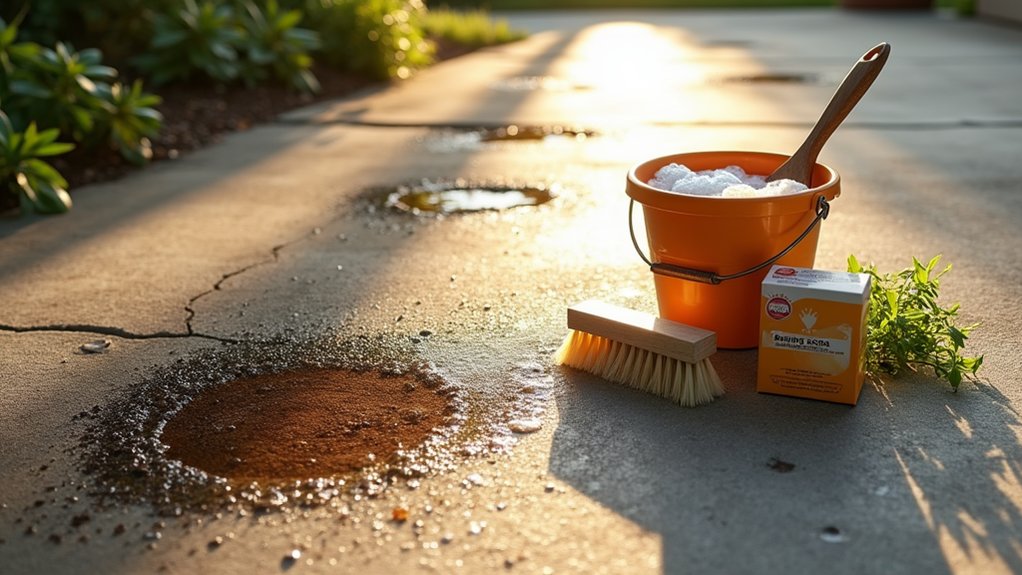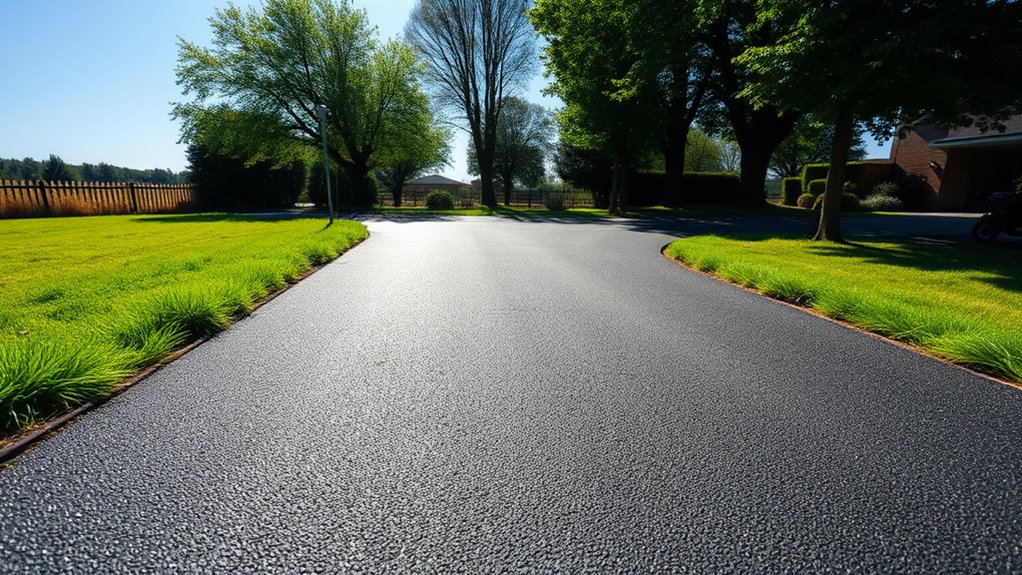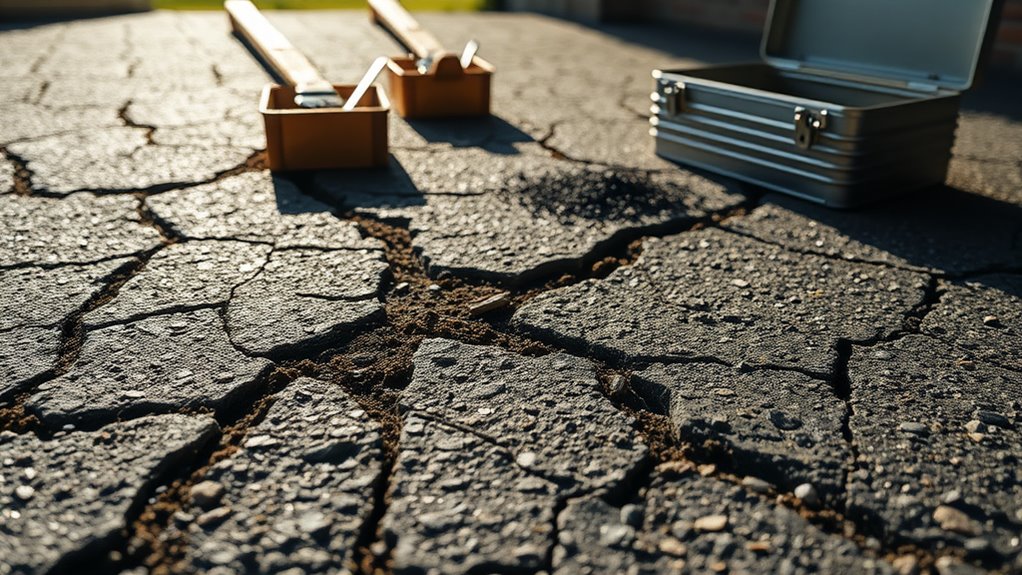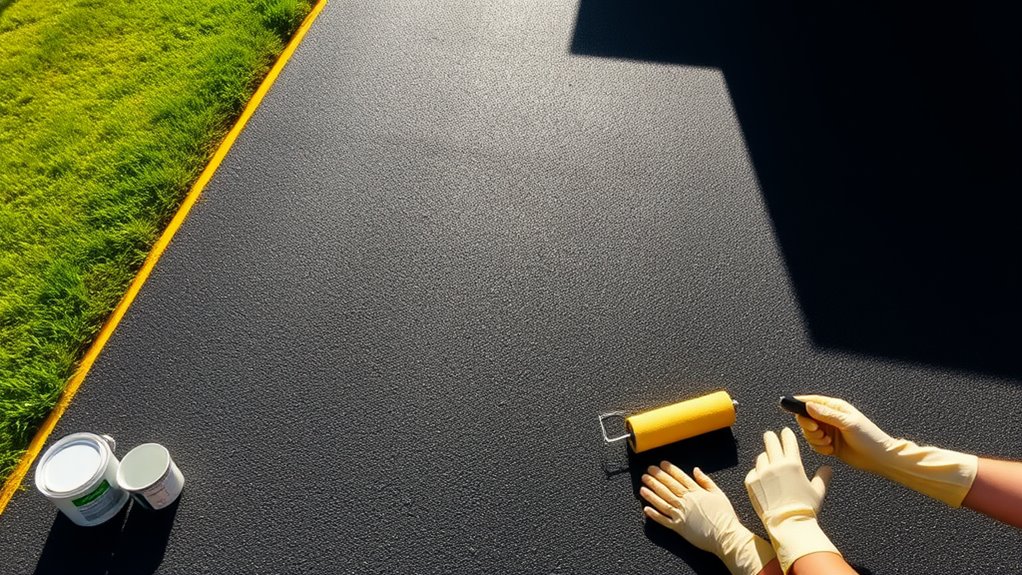To remove oil stains from your driveway, act quickly to absorb fresh spills using materials such as clay cat litter or baking powder. For stubborn stains, scrub with warm, soapy water or use commercial cleaners. Always rinse thoroughly to prevent any residue. Regularly inspect your driveway and manage spills promptly to maintain its condition. Consider eco-friendly cleaning options for a more sustainable approach. If you’d like additional tips on prevention and upkeep, there’s plenty more information available!
Table of Contents
ToggleKey Takeaways
- Act promptly to soak up fresh oil spills using materials like cat litter or baking powder for optimal results.
- For older stains, combine warm water with mild detergent and scrub the affected area thoroughly.
- Follow the instructions on commercial products, ensuring you rinse well to eliminate any residues.
- Consider eco-friendly options such as Simple Green OxySolve or Pour-N-Restore for effective and sustainable cleaning.
- Seal your driveway every 2-3 years to guard against future stains and damage.
Understanding Fresh Oil Stains
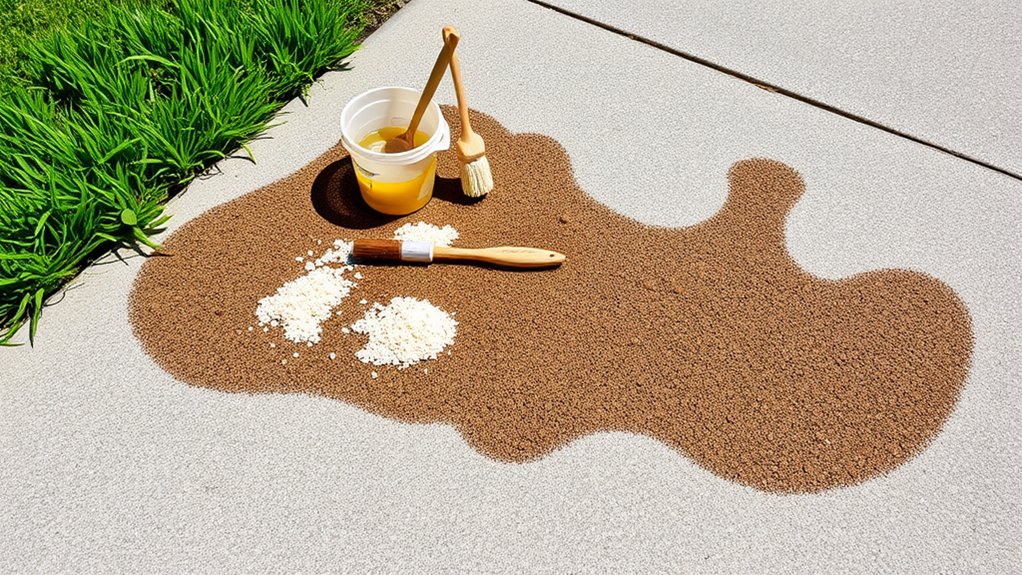
When you notice a fresh oil stain on your driveway, it’s crucial to act swiftly, as the longer it remains, the more challenging it’s to remove.
First, identify the type of oil responsible for the stain—whether it’s motor oil, transmission fluid, or petrol. Knowing the oil type will help you select the best removal method.
Oil seeps deeply into porous surfaces like asphalt and concrete, causing discolouration and potential damage. Choosing the right cleaning solution is essential to effectively tackle the oil stain.
Leaving it for too long can harm not just the look of your driveway but also the environment.
Immediate Actions for Fresh Oil Spills
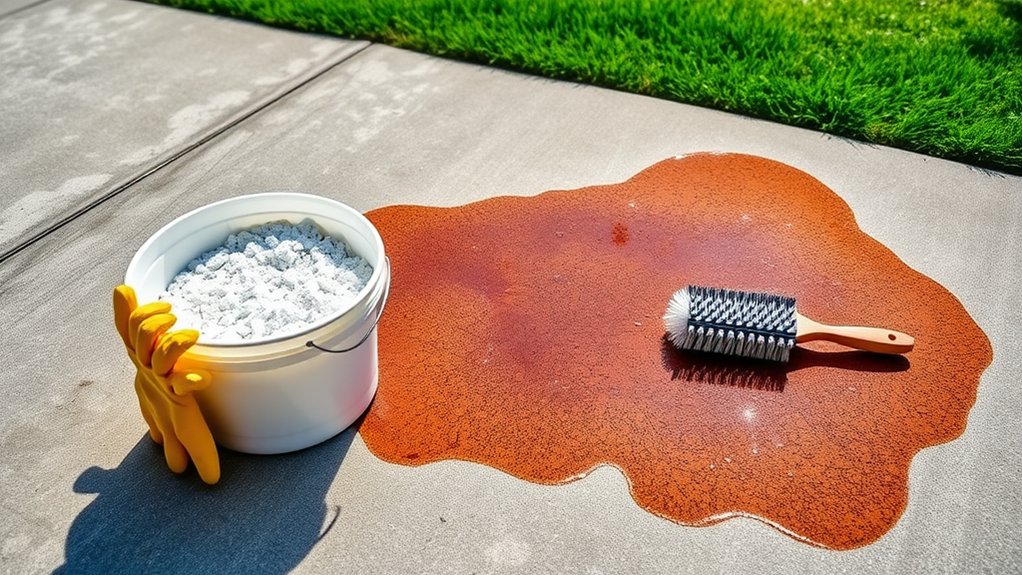
When you notice a fresh oil spill, act swiftly to contain it and reduce damage. Use absorbent materials like clay cat litter or baking powder to soak up the oil, applying them generously and allowing them to sit for a bit. All concrete is porous, necessitating prompt action to prevent deeper penetration. Once that’s done, you can enhance your cleaning with common household items to ensure the stain doesn’t stick around.
Absorbent Materials Usage
Immediate action is crucial when tackling fresh oil spills on your driveway. The quicker you respond, the more effective your absorbent material will be.
Start by covering the entire spill area to ensure maximum absorption. Here are some effective household absorbents you can use:
- Paper towels or old newspapers for quick blotting
- Non-clumping cat litter, thanks to its granular texture
- Baking soda or cornstarch to soak up oil
- Fresh sawdust, which is both natural and cost-effective
- Sand, a readily available option for encapsulating spills
Additionally, kitty litter effectively absorbs oil spills and can be ground into concrete for better absorption. Spread a thick layer of your chosen absorbent, leave it for several hours, then sweep it up carefully.
This straightforward method can significantly reduce the risk of staining your driveway.
Cleaning Agents Application
Acting quickly with cleaning agents is crucial for dealing with fresh oil spills on your driveway. Start by controlling the spread—spray the area around the spill with water.
Immediately blot up any excess oil using disposable cloths. For effective stain removal, mix warm water with a few drops of mild detergent, then scrub in circular motions with a stiff-bristled brush.
If you prefer commercial cleaning products, apply a specialised cleaner directly onto the stain and let it sit as per the instructions. Scrub the area to enhance the cleaning effect.
Finally, rinse thoroughly with clean water to remove any residue. Always wear protective gear and ensure proper ventilation for safety and optimal results.
Effective Absorbent Materials
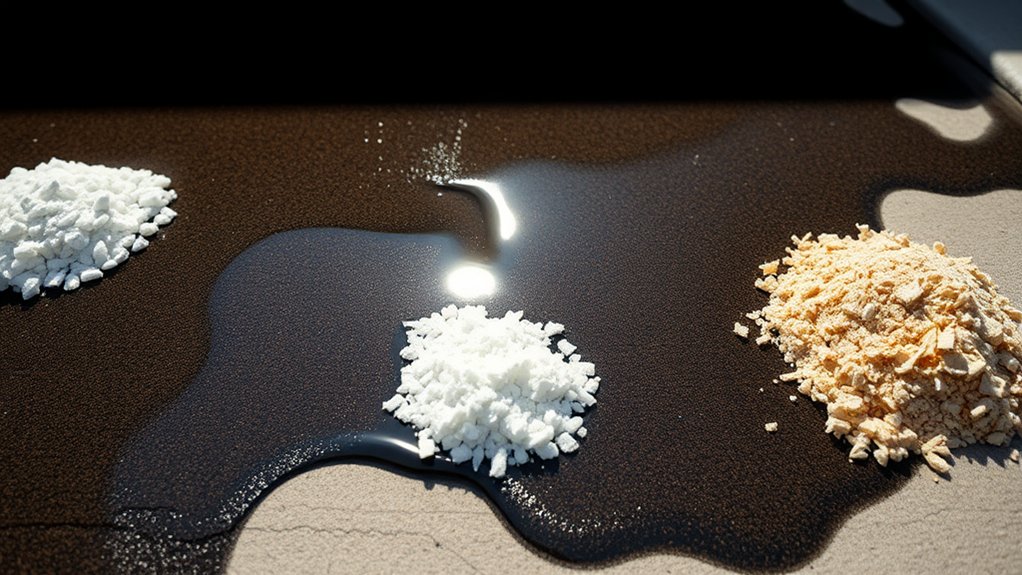
Several effective absorbent materials can help you tackle oil stains on your driveway easily. Here are some top options to consider:
- Cat Litter: Particularly effective at soaking up oil spills; clay-based types work best.
- Baking Soda: A good alternative if cat litter isn’t on hand; it absorbs oil and neutralises odours.
- Commercial Oil Absorbents: Specifically designed for petroleum stains, these often combine degreasers with absorbents for better results.
- Sawdust: A natural, biodegradable option that quickly absorbs oil and is simple to dispose of.
- Paper-based Absorbents: Ideal for immediate containment, allowing you to blot fresh spills before using stronger materials.
Chemical Cleaners for Fresh Oil Stains
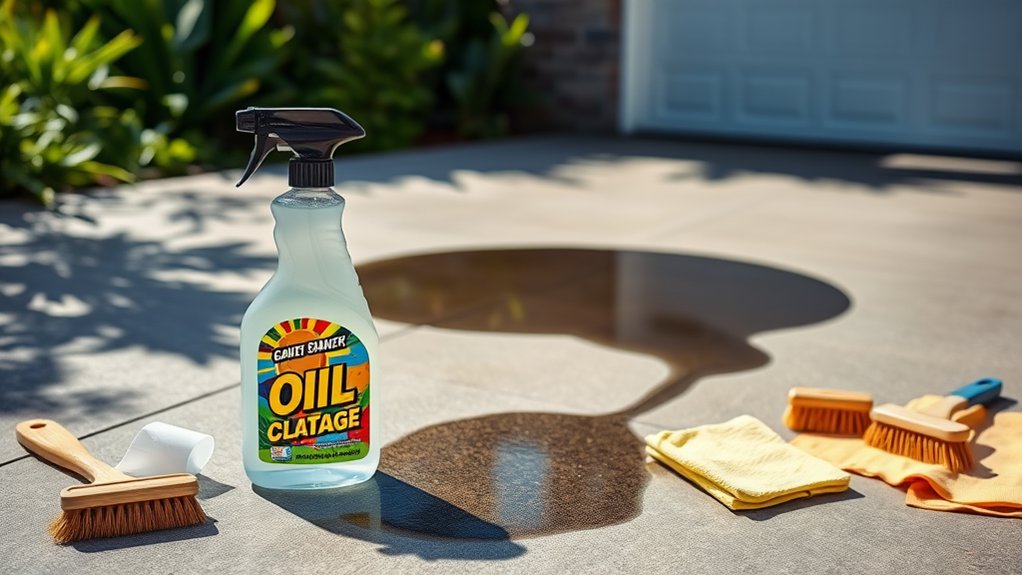
When tackling fresh oil stains on your driveway, chemical cleaners can effectively complement absorbent materials. These products utilise their unique chemical properties to break down oil quickly. Simply pour or spray them directly onto the stain for best results.
| Product | Key Features |
|---|---|
| Pour-N-Restore | Eco-friendly, no scrubbing needed |
| Zep Concentrated | Versatile, requires dilution |
| Dynamite Degreaser | Powerful for stubborn stains |
Always wear protective gear when using these cleaners and allow the product to sit for the recommended time. With the right application, those annoying stains will disappear in no time!
Dealing With Set Oil Stains
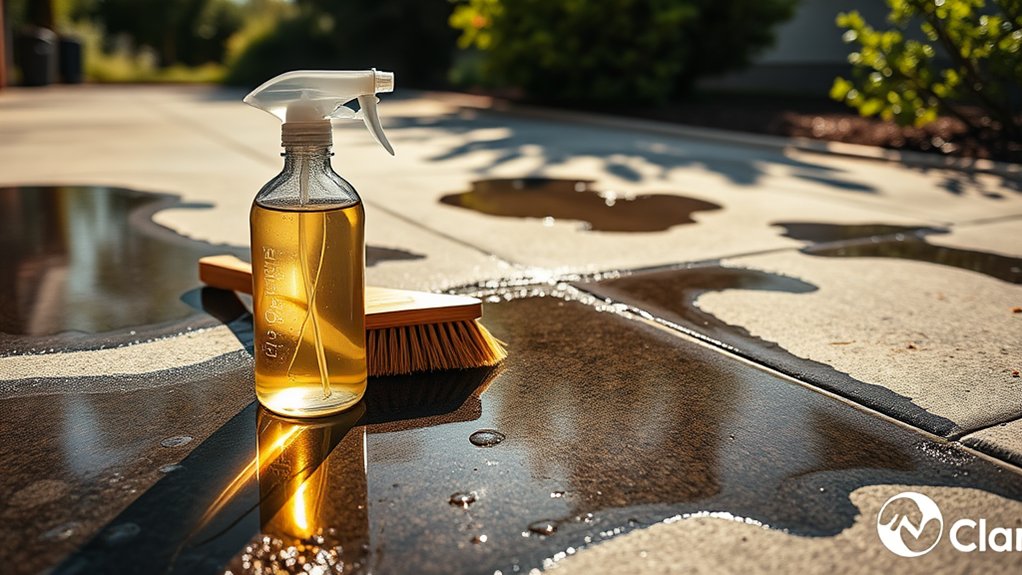
Dealing with set oil stains can be annoying, but there are effective methods to remove them. Here are some straightforward options:
- Toilet Bowl Cleaner: Apply to the stain and rinse with a hose.
- WD-40: Spray on the stain, leave for 20 minutes, then wipe clean.
- Oven Cleaner: Apply and scrub after 10 minutes.
- Bleach Solution: Spray, soak, and scrub to lift the stain.
- Sawdust and Paint Thinner: Use sawdust to absorb the oil, and paint thinner as a solvent.
Act quickly; the sooner you address a stain, the easier it’s to remove.
Regularly cleaning your driveway can also help prevent stubborn stains from forming.
Specialized Products for Tough Stains
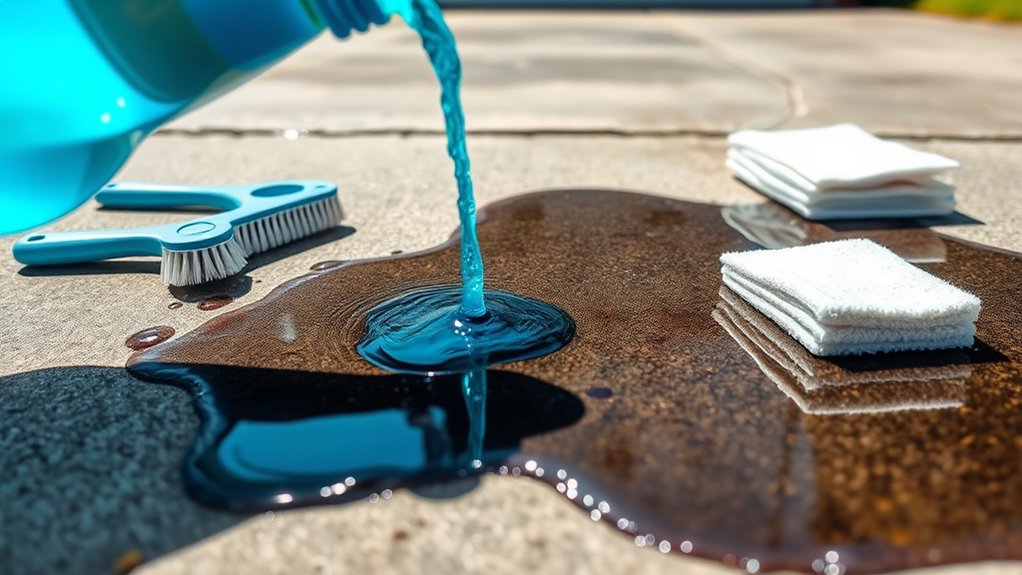
If you’re tackling stubborn oil stains, using specialised products can greatly improve your driveway’s appearance.
For example, Pour-N-Restore combines a strong citrus degreaser with patented Micro-Extraction Technology™, which effectively lifts embedded oil stains.
New Pig’s Microbial Oil Stain Remover is noted for its eco-friendly method, harnessing microbial action to break down oil and fuel stains.
Oil Eater offers a quick-acting peroxide-based foam that works overnight, ideal for busy homeowners.
Zep’s concentrated cleaner is designed for larger projects and can handle tough grime.
When selecting a product, pay attention to user reviews and consider techniques like covering the entire stain with a margin for optimal results.
Your driveway will certainly benefit!
Tools and Equipment for Oil Stain Removal
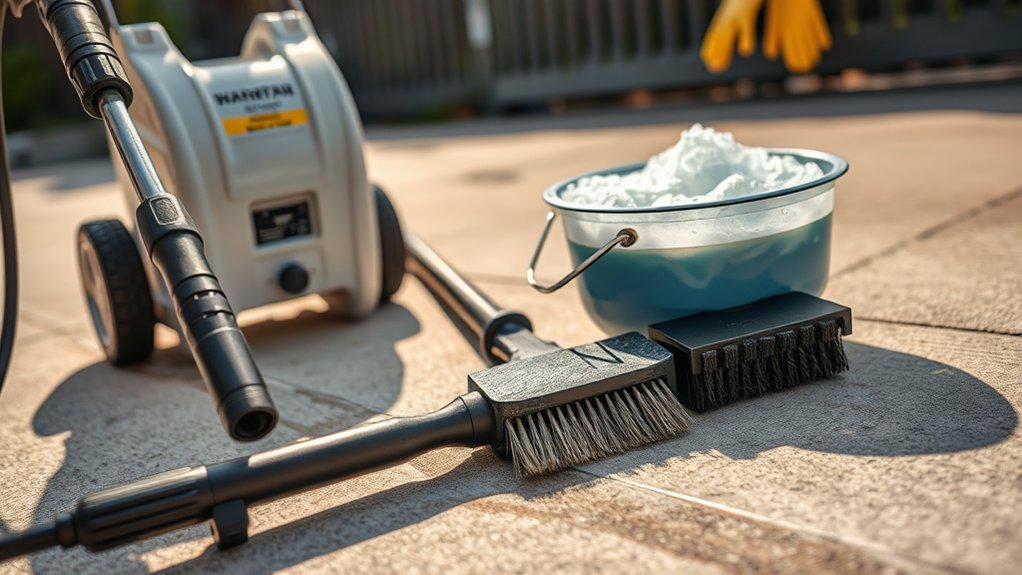
Having the right tools and equipment is essential for effectively removing oil stains from your driveway. Proper maintenance tools enhance your cleaning techniques and ensure success.
Here’s what you’ll need:
- Powdered spill absorbers (such as Oil-Dry) for fresh spills
- Stiff-bristle scrub brushes to agitate and lift the oil
- Pressure washers for thorough stain removal
- Manual spray bottles for even application of cleaning agents
- Personal protective equipment (PPE) to keep you safe
With these tools, you can efficiently tackle stubborn oil stains.
Acting quickly with absorbents can significantly improve your results, making the process easier and more effective.
Preventive Measures for Driveway Maintenance
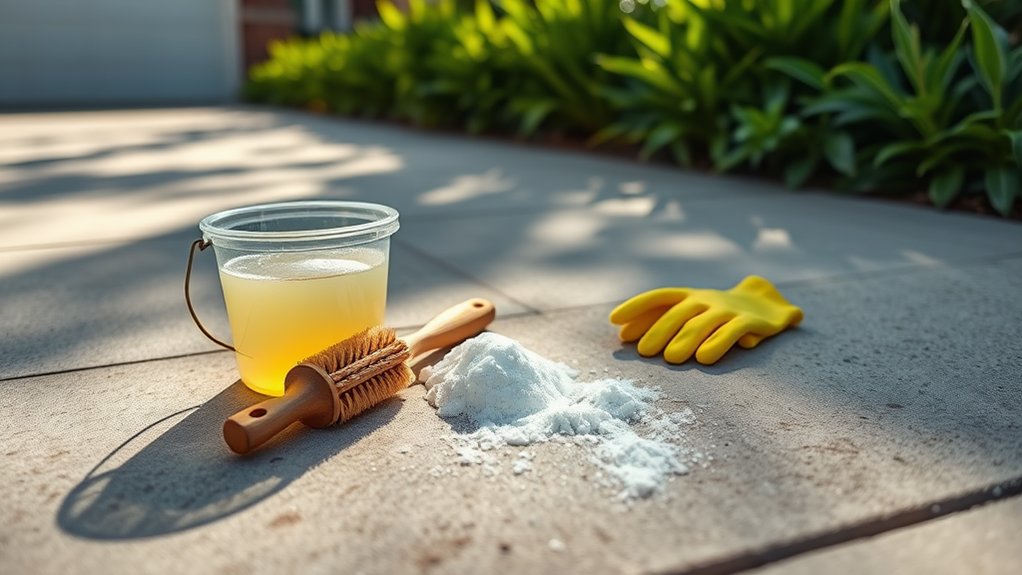
To keep your driveway in excellent condition and prevent oil stains, it’s important to take some straightforward preventive steps.
Start by sealing your driveway every 2 to 3 years to create a protective layer against oil and other contaminants. Effective drainage is also crucial; ensure your driveway has a slight slope to facilitate water runoff and consider installing features like swales to redirect contaminated water.
Using quality materials such as “crusher run” gravel or stain-resistant asphalt can enhance durability. Regularly apply sealant in summer to protect against UV damage and extend the life of your driveway.
If spills occur, deal with them immediately using absorbent materials. Regularly inspect your driveway to catch any early signs of contamination.
Regular Cleaning Tips for Driveways
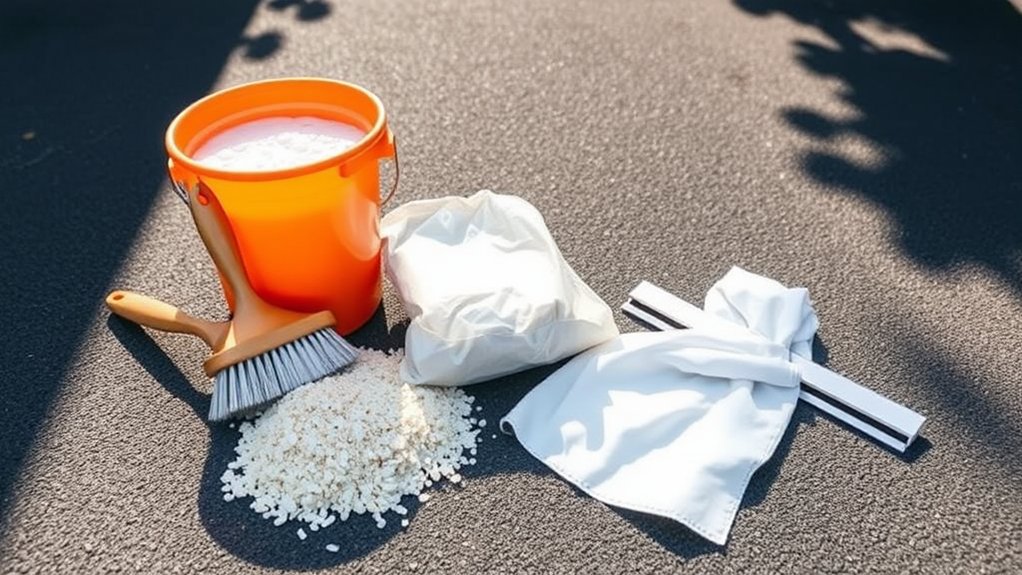
To keep your driveway in excellent condition, set up a regular cleaning schedule. Use cleaning products specifically designed for driveways to effectively remove dirt and stains. For example, a pressure washer can be great for tackling stubborn marks. Additionally, regular cleaning helps prevent harmful substance buildup that can degrade the surface, ensuring driveway integrity and longevity.
Scheduled Maintenance Routine
Maintaining your driveway may not seem urgent, but regular cleaning and upkeep can significantly extend its lifespan and improve its appearance.
Establishing a scheduled maintenance routine is essential for proper driveway care.
- Inspect for damage every month to identify issues early.
- Plan repair tasks by season, with spring being ideal for major fixes.
- Ensure proper drainage to prevent water pooling.
- Manage weeds to stop plant growth in cracks.
- Set aside a budget for maintenance and repairs.
- Regularly clean the driveway to remove minor spills and debris before they lead to more significant issues.
Effective Cleaning Products
When dealing with oil stains on your driveway, selecting the right cleaning product is crucial. Eco-friendly options like Simple Green OxySolve are effective, using an oxygen-based formula to lift tough stains.
For more stubborn marks, try Pour-N-Restore Oil Stain Remover, which features Micro-Extraction Technology™ for deep cleaning.
Alternatively, a simple mix of laundry detergent or dish soap with water can work well on dried stains. Be sure to scrub the affected area with a sturdy brush and rinse thoroughly to eliminate any residue.
These products and methods not only help you achieve a cleaner driveway but also ensure you’re being mindful of the environment while tackling those annoying oil stains.
Frequently Asked Questions
Can Oil Stains Damage Concrete Permanently?
Yes, oil stains can cause permanent damage to concrete if left untreated. It’s essential to focus on preventing stains and to regularly apply concrete sealant to protect your surfaces, keeping them both durable and looking good. For instance, a simple spill from a car can lead to unsightly marks that are hard to remove, so taking proactive measures is key.
How Can I Prevent Oil Stains Before They Happen?
To prevent oil stains, implement simple measures like regular maintenance checks on your car, using absorbent mats, and applying protective coatings. Keeping your driveway clean is also essential for maintaining its condition.
Are There Eco-Friendly Options for Cleaning Oil Stains?
“An ounce of prevention is worth a pound of cure.” For eco-friendly cleaning, opt for biodegradable cleaners and natural absorbents like bicarbonate of soda or cat litter. These options effectively tackle oil stains and are gentle on the environment.
What Should I Do if the Stain Persists After Cleaning?
If the stain remains after cleaning, take another look at your cleaning methods. You might want to try stronger stain removers or more absorbent materials to tackle the residue. Sometimes, a bit of persistence and the right approach can make all the difference with stubborn stains. For example, a vinegar solution or baking soda paste can work wonders on tough marks.
Is It Safe to Use Bleach on Concrete for Oil Stains?
Is bleach safe for removing oil stains from concrete? Definitely not! Bleach can compromise the integrity of your concrete. Instead, opt for safer alternatives like enzymatic cleaners, which effectively tackle those stubborn stains without risking damage to the surface.
Conclusion
In the fight against oil stains, your driveway can look as good as new with the right approach. By acting quickly and using effective tools, you can turn an eyesore into a testament to your home maintenance. Each oil stain removed shows your commitment to a tidy property. Implementing preventive measures will ensure your driveway lasts longer and reflects your dedication to a clean, inviting space. Keep it looking its best!
Maximize the durability of your tarmac driveway by understanding the ideal weather conditions for installation—discover the secrets to perfect timing Read more
Discover the common causes of tarmac driveway cracks and learn effective repair methods to protect your investment—your driveway deserves the Read more
Before you paint your tarmac driveway, discover essential tips and techniques that can transform its appearance and durability—don't miss out Read more

